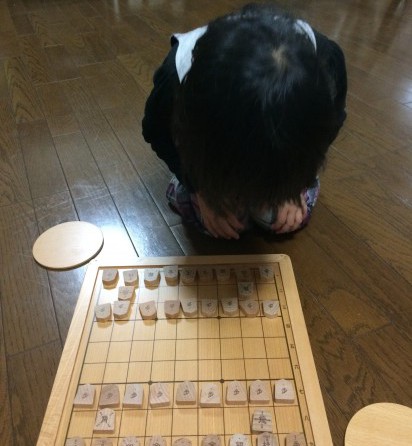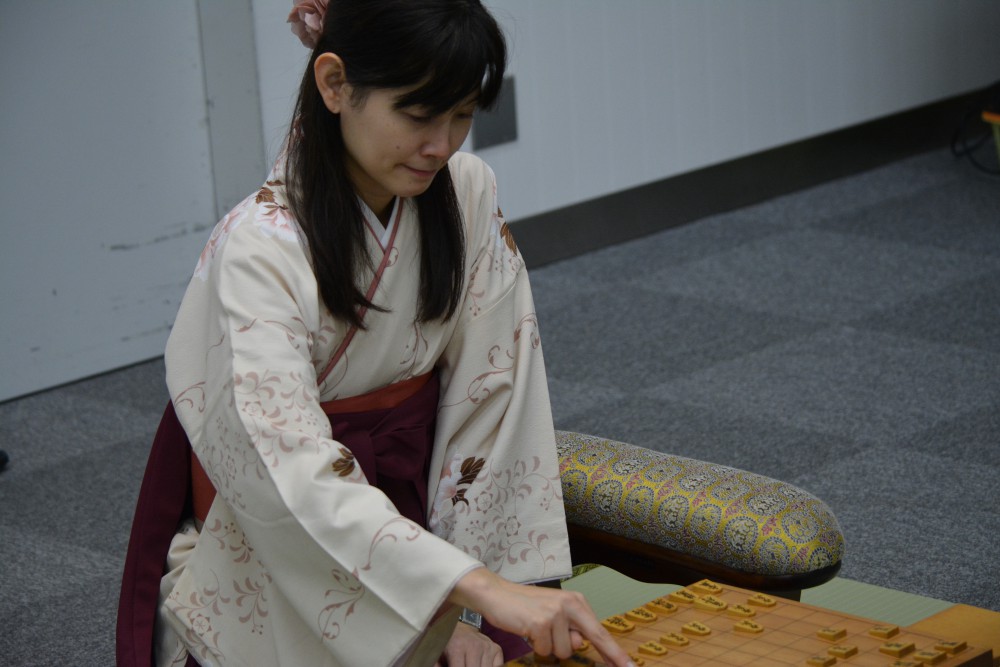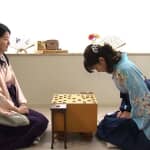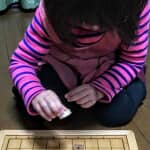Child-raising Shogi 2 November 2016
Five tips for children playing Shogi on the Internet
There are fulfilling Shogi software and online Shogi games are available lately. I hope that people play in person Shogi since I believe we can learn a lot from Shogi as a communication tool. Still, I also think online Shogi games are beneficial in terms that we can engage in actual matches easily at our convenience. So, I hope you use online Shogi games wisely as a starter or a training to enhance your skills. Today, I would like to introduce some tips that parents might find useful when they want to advise children playing online Shogi games.
1. Children perform the usual greetings even when they play on the Internet.
It is a little strange to give greetings toward the PC, but I hope that parents teach children to greet to the PC just like they do to people.
I teach children “Mittsu no Rei (the three pieces of courtesy)” of Shogi. “Mittsu no Rei” means the following three phrases of greetings.
- “Onegaishimasu (I’d like to rely on you to play this game with me.)”
- “Makemashita (I have lost.)”
- “Arigatou gozaimashita (Thank you very much for playing this game with me.)”
I know it is weird to greet to the PC, so, how about just say “Onegaishimasu”?
A hamster character gives us a bow at the beginning of the game on “Hamu Shogi,” an online Shogi game. If children make it a habit to say “Onegaishimasu” to the character, I think that helps children to naturally greet in a real match.

I once met a mother and a child who learnt Shogi through online games when I was an instructor for a beginners’ class. I told them “Mittsu no Rei.” They said, “It was great to learn manners of Shogi and traditional culture today!” If they learn aspects of traditional Japanese culture in Shogi along with its entertainment side, I believe that they can find the profoundness of Shogi.
2. Do not use “Matta” function.
“Matta” means “act of undoing the last move that has been already played, trying to change it to a better move.” “Matta” is a foul play in official matches, and you lose for it. Some Shogi software have “Matta” function. It is a function to give a novice player a permission to redo the previous move which they made carelessly. When I teach beginner children, I sometimes advise them that they should redo the previous move, saying “Your GYOKU will be captured if you make this move. Why don’t you think a little more?” So, I think it is okay for a very novice child to use “Matta.” However, never let children who have already learnt Shogi use “Matta” function.
If we use “Matta” regularly, we come to make a move without serious consideration. It is very important to think carefully and make a responsible move since this process would also cultivate thinking skills.

Once I met a child who used “Matta” without being embarrassed on his first visit to the Shogi class. He might have often used “Matta” function on the Internet. This is also rude to the opponent. Considering those, we had better not use “Matta” function even when we play online Shogi games. I can assure that you will be absolutely stronger if you practice Shogi without the “Matta” function.”
3. Use the records for assessment and goal-setting.
The online Shogi game sites have a recording function for outcomes of matches or scores. We can use these records to assess children’s achievements, and to set goals for them. Online Shogi game matches accurately indicate the current level of children’s skills. For example, a child may not be able to win when they have just learnt a new tactic. However, soon they come to win and realize they have mastered the tactic. Furthermore, the records on online Shogi game sites help children to set a goal, and motivate them.
However, it is not good to feel up and down too much about the records and scores on the websites. Children can learn something such as a new strategy even out of the lost games. I recommend that parents maintain a long-term perspective.

4. Let children understand the importance of accepting one’s own defeat.
I think that accepting one’s own defeats is even harder for children when they play on the Internet since nobody is really watching over the match. Children cannot see the opponent facing them.
I myself met an opponent who consumed all the time and left instead of resignation when he/she was about to lose on the online Shogi game. I also encountered an opponent who did not even say “Thank you” on chat before leaving the site. I understand their feelings since I myself get disappointed and frustrated when I lose. However, I think such a behavior is rude toward the opponents who seriously played the game with you. It is important to show appreciation toward the opponents even on online matches. I hope that people always show courtesy toward the opponents in Shogi regardless of the medium of the games.
There was a Shogi match called “Denou Sen,” a Shogi competition between a human Shogi player and a computer Shogi software. The human player deeply bowed toward the PC after his loss. I think it was impressive and touching to see his sincere attitude no matter who the opponent was.
That was off today’s topic. Accepting one’s loss gives us an opportunity to think about the cause of the defeat, and thus, we can learn something out of it and apply what we have learnt in the next game.
5. Face the Shogi board in the “Kansou Sen (Postgame analysis).”
I recommend that you face the Shogi board after the match on the Internet. There is “Kansou Sen” function using chatting on the website where we can play with other people. This function is useful for adult Shogi players, but parents must have a concern to let children use this. Children can reflect the moves on the actual board by themselves instead of using the chatting. That is still effective. If a child reviews the game as much as he/she remembers, he/she can gain far more than simply playing online games. Thus, I recommend that parents advise children to spend some time reviewing the match.
Some Shogi software automatically store “Kifu (Shogi game score)” during the games. I think it is further productive if you can show your child’s Kifu to a stronger player than your child, and receive a piece of advice on that.

The online Shogi games are easy and handy, but I think it is waste if you play Shogi only on the Internet since Shogi can provide us with opportunities to learn manners and courtesy, and to engage in generation-free interexchanges.
You can make a good use of the online games if you and your children watch professional players’ matches on TV, or attend some Shogi events/classes together. Online games can be useful to improve children’s Shogi skills if parents plan something like the above.
It is also important for parents to supervise children not to indulge themselves in online games.
I believe parents are concerned about children’s vision affected by online games.
Online Shogi games are easy and fun, and we can play at our convenience. So, I think that it is good if we can enjoy online games together with in person Shogi matches.
I am happy if I could help you to use online Shogi games as a starter and a part of your training.
The followings are some online Shogi game sites, for your reference.



